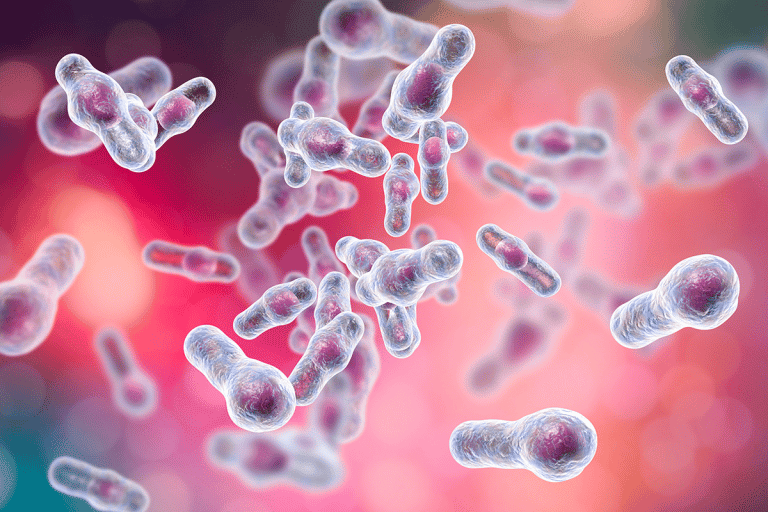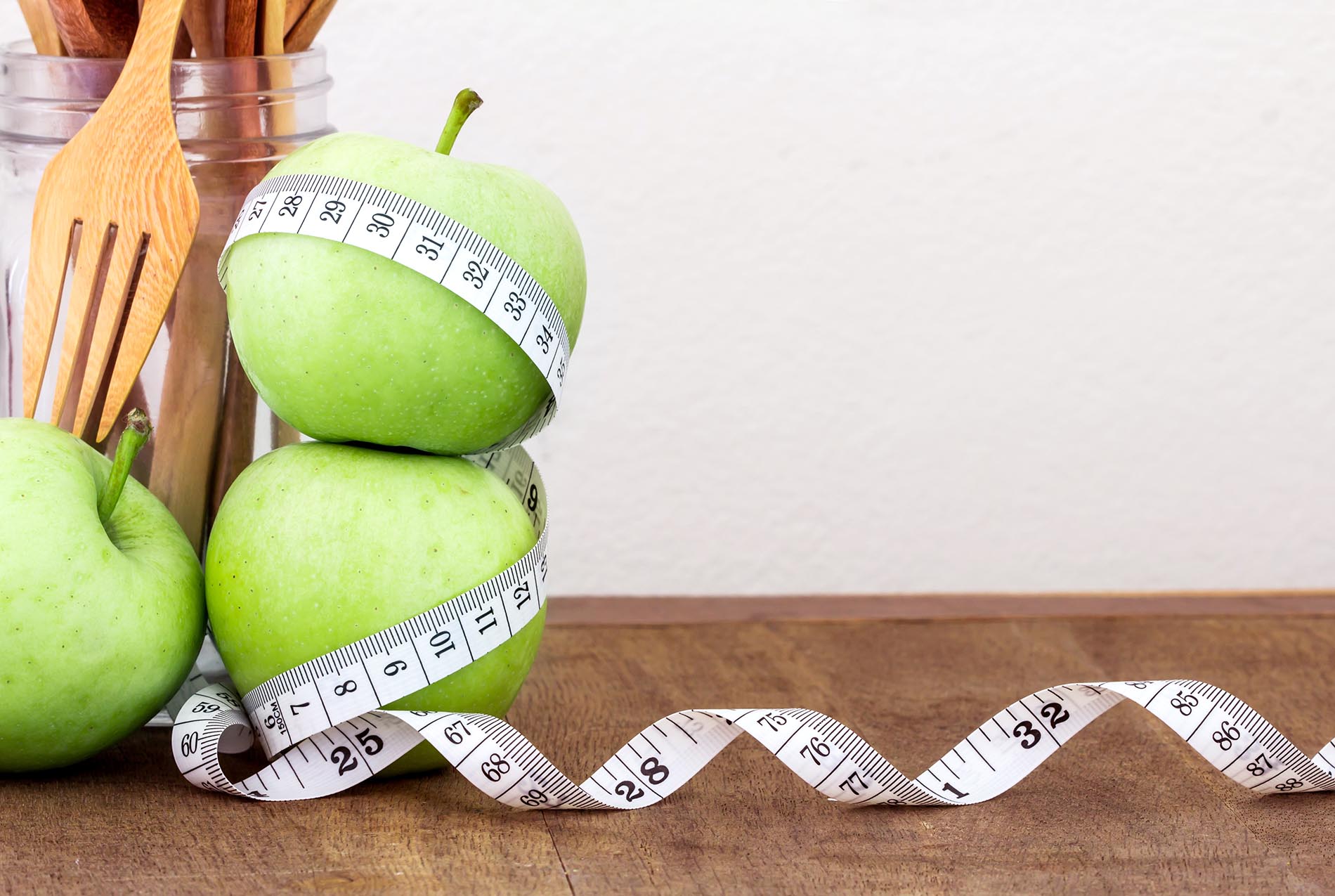
Herbert Hauser
The gut – the root of many weight issues
The amount that is accomplished daily by our digestive system is enormous and is vital for our survival. No matter if its fruit, vegetables, bread, or meat that you ate; on the way through the digestive tract the body takes what it needs from these foods. This is made possible by complex processes which we have come to understand quite well. A quite recent discovery elucidated the role of the gut flora in digestive processes. It has become clear that the billions of bacteria that make up the gut flora play a significant role in the processing of ingested food.
Building material and energy
Our organism constantly needs building materials and energy donors. Proteins and water are the main building blocks that make up our bodies. Nutrients which supply calories (AKA energy) are mainly carbohydrates and fats, but also alcohol. These are so-called macronutrients and the body needs them in large quantities. As opposed to micronutrients which are only needed in very small quantities. However, this doesn’t make them any less important. Micronutrients are indispensable for many bodily functions (e.g. cellular processes, the effect of enzymes, or they can even act as antioxidants). Nowadays, what mainly decides our daily diet is what we currently feel like eating. It’s not necessarily a constant evaluation of what to eat in order to avoid an over- or undersupply of nutrients. Seen from the perspective of a nutritional scientist, our daily nutritional requirements are the nutrients necessary to cover the so-called basal metabolic rate and active metabolic rate (see the info box). The difference between the energy amount in the food we eat and the amount of spent energy results in a calorie balance, which also influences one’s body weight. When this difference exceeds a certain amount, we gain weight. If it’s a negative balance, we lose weight. In general, this simple calculation holds true. However, as the saying goes: “The exception proves the rule”.
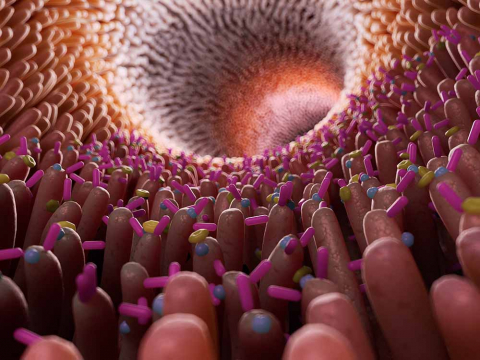
From slim to overweight
Physicians differentiate between ideal, normal, overweight, and in extreme cases obesity. When someone has collected superfluous kilos over the years, they may prove to be difficult to get rid of again. “Especially in the beginning of losing weight it can be difficult to take the first step”, reports Elke Föls, a dietician at the health resort Bad Schönau in Lower Austria. “It is important to reassure those willing to lose weight. For example, many have the fear that they will never be able to eat something delicious again. In many cases, people associate losing weight with nothing but prohibition. In reality, everything is allowed – the quantity makes the difference!” An interesting side note: women consume more sweets and men drink more alcoholic beverages like beer. “Oftentimes, women say that their weight gain is caused by menopause” says Föls. Partly, this is really the case because additionally to the hormonal change occurring with menopause, the basal metabolic rate decreases with age. If in consequence a diet adaptation does not occur, the excess supply of energy leads to an increase in adipose tissue and so weight gain.
There’s no such thing as a miracle diet
When it comes longer time periods, ultimately, it’s all about weight management and maintaining one’s desired weight. In this regard, discipline is absolutely essential – and yet, it would be so great if there was a simple formula to losing the excess fat responsible for those unwanted kilos. But: “In life there’s never a simple formula”, says Elke Föls. She recommends to “steer clear of diets which promise miracles.” In her consultations, she recommends her clients to start with measures which are easily feasible: “As opposed to a radical complete change in diet, small changes become a habit more quickly and so make it easier to maintain one’s weight.”
Naturally things like calorie reduction and increased exercise also help to lose weight. However, as previously mentioned, not all the many processes involved in the metabolisation of our food are completely understood yet. Genetic predispositions are a further factor which cannot be disregarded. Furthermore, recent scientific findings have shown that the individual composition of a person’s gut flora also plays a role in the utilisation of ingested food. In the last 10 years, through the implementation of modern research and analysis methods, it has become possible to decipher this highly complex mixture of microorganisms.

Bacterial imbalance
There are already numerous studies showing the individual effects of select bacteria of the microbiome. For example, a study with 50,000 children could show that every antibiotic therapy completely destroys up to 10 percent of the around 500 bacterial species. At the other end of the age spectrum, 70 to 75 year olds had only around 50 to 80 different bacterial species colonising their guts. When the gut flora is depleted to such an extent, certain bodily functions (which aren’t necessarily vital for short-term survival) can no longer be fulfilled. For example: the boosting of immune cell production. An imbalance of the microbiome can also be a potential hurdle on the path to one’s dream weight. New scientific findings have shown that people suffering from obesity have higher numbers of a specific bacterial species in their guts than slim people. This involves the two large bacterial groups called Bacteroidetes and Firmicutes. Ideally these should both be present in a ratio of 1:1. It was shown that the Firmicutes are strongly predominant in the gut flora of obese people.
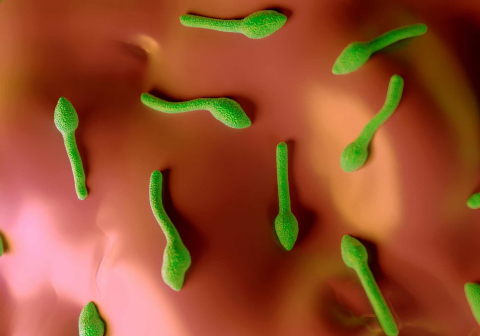
They extract up to 12% more calories from the food we eat: Firmicutes
Do slimming bacteria exist?
This imbalance also influences the ways ingested food is processed. Firmicutes extract every single calorie from the eaten food. This “hidden” additional intake of carbohydrates can mean that twelve percent more calories are absorbed each day. According to current findings, the restoration of the balance between Bacteroidetes and Firmicutes can lead to a weight change. A product which contains specific bacteria that enable a reduction of “fattening bacteria” is the synbiotic OMNi-BiOTiC® metabolic. Additionally, experts recommend taking OMNi-LOGiC® apple pectin. It is a combination of dietary fibres which serve as nourishment for the “slimming bacteria”. If one is successful in restoring the balance between Firmicutes and Bacteroidetes with the help of pro- and prebiotics, then losing weight will become easier and the effect will be sustainable. The dietician Föls reports her own experience regarding the effects of OMNi-BiOTiC® metabolic: “At my prior workplace I conducted an observational study on overweight and obese patients using this product. The feedback I received from patients was by all means positive. A large portion of them wanted to continue taking it at home.” Alone the fact that the patients reported an improvement of well-being shortly after the first intake of the synbiotic is already a big success in her opinion.
Basal metabolic rate and active metabolic rate
- The basal metabolic rate signifies the energy demand when the body is at rest (e.g. for the maintenance of body temperature and various organ functions).
- The active metabolic rate refers to the energy needed to perform daily activities such as housework, shopping, and occupational activities.
- The daily energy demand is the result of the basal metabolic rate plus the active metabolic rate. It is defined as a certain value per day.
- One should never try to lose weight by eating less calories than are necessary for the basal metabolic rate because it will cause the body to react with a starvation response. In this situation, the basal metabolic rate is lowered, thus leading to the development of more fat deposits as soon as one starts eating normally again. When in the process of losing weight, one should consume 300 to 500 kcal less than one normally would each day. However, the energy intake should never be less than is required for the basal metabolic rate.
Monitor success, to eliminate errors
“What’s most important when it comes to weight loss is not the weight displayed on the scale. Rather, it’s the changes in the body that a conventional scale will not show you” emphasises Föls. That’s why she likes using bioelectric impedance analysis (BIA) to occasionally check how successfully someone is losing weight and to uncover any dietary errors. BIA provides information about a person’s muscle mass, water balance, and fat mass. An ideal weight reduction should only result in a reduction of fat. It should never result in a loss of muscle mass. “That’s why sport and a diet change should always occur in combination to achieve a successful and healthy weight reduction”, sums up Elke Föls.
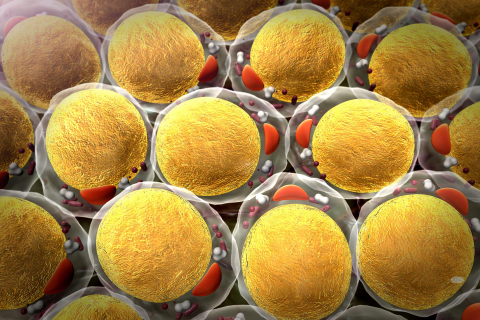
Superfluous calories from our food are transformed into fat and stored for “times of need”.
Step by step towards one’s dream weight
Patience and strong commitment are both necessary when it comes to losing weight; and that requires a strong will. Without this drive to fight one’s inner weaker self, most attempts at weight loss will fail. In her dietetic practice, Föls recommends overweight clients to at first set themselves small goals: “At first, small steps only reap small rewards. However, such small first measures are easily integrated into one’s daily routine and so in time ensure the biggest reward. There’s no point in changing one’s life completely for three to four weeks, just to give up afterwards.” Now, what goals are realistic? Dieticians as well as nutritional physicians set the bar to around ½ to 1 kilo a week. Föls recommends most of her patients to aim to lose 1 to 2 kilos a month, “this allows for small diet transgressions which helps to keep up their motivation”. After all, this by all means realistic amount can add up to 12 to 24 kilos less per year. However: “When it comes to dietary counselling and support of overweight individuals, only an individualised goal is a realistic goal”, reveals Föls.
Bacteria in portraits
Our weight is associated with our gut bacteria. More specifically with the ratio between Firmicutes and Bacteroidetes. In people of normal weight this ratio is balanced. However, in overweight people the proportion of Firmicutes far outweighs that of the Bacteroidetes.
Firmicutes
These bacteria are especially efficient at breaking down the indigestible fibre from our food into so-called “short-chain” carbohydrates. This leads to the emergence of many simple sugar molecules in the gut. These are quickly absorbed and stored as fat deposits for “times of need”. An excess of Firmicutes means that up to 12% more calories are absorbed from every meal. Additionally, the Firmicutes possess an ability which makes it especially hard to lose weight: in “times of fasting” they turn our body into energy saving mode so that our body burns less calories than it normally would. As soon as we start eating normally again, every single calorie is extracted from our food and we gain weight again: this is the so-called yo-yo effect.
Bacteroidetes
Nowadays, oftentimes our diets contain more sugar than our bodies need. Sugar is unhealthy for humans because it can quickly be converted into alcohol in the gut, which in turn damages the liver. Bacteroidetes recognise this excess sugar and encapsulate these unnecessary carbohydrates directly in the gut. In this way, the “surplus” can be excreted via the stool. Stool analyses confirm this: If the gut flora is rich in Bacteroidetes, our excretions contain more unspent calories than when there is a Firmicute oversupply.









